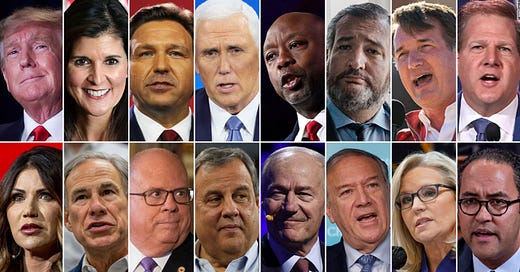Three more Republicans — Mike Pence, Chris Christie and Doug Burgum — will join the 2024 presidential race this week.
Which brings the total number of candidates running for the Republican nomination to double digits.
Cue Republican handwringing.
The worry goes something like this:
Donald Trump can’t win a general election
The best way to beat him in a primary is for one clear alternative to him to emerge — and emerge quickly
The more candidates who jump into the race, the less likely that is to happen
Donald Trump can’t win a general election
I get the thinking — and there’s truth in that sentiment. Trump undoubtedly benefits from a crowded Republican field where the not-Trump vote gets divvied up between a whole bunch of candidates as exposed to a single candidate.
Which means that Trump’s hardcore 30%-35% could then be enough to win him the nomination. Again.
All of which is, broadly speaking, right.
But, it’s also looking at the telescope through the wrong end. The key is not how many candidates get INTO the race. The key is when they get OUT of the race.
“I don’t mind who gets into the field, but given where the polls are right now, every candidate needs to understand the responsibility of getting out and getting out quickly if it’s not working,” said New Hampshire Gov. Chris Sununu on Monday. (Sununu also announced he was not running for president.)
Yes! Exactly that!
Consider the arc of the 2016 race.
Texas Sen. Ted Cruz won Iowa. Trump won New Hampshire. Then came the pivotal South Carolina primary — on February 19. The results looked liked this:
Trump 32.5%
Marco Rubio 22.5%
Ted Cruz 22.3%
Jeb Bush 7.8%
John Kasich 7.6%
Ben Carson 7.2%
Now, imagine what the race would have looked like without Bush and Kasich — two candidates clearly competing with Rubio for the establishment mantle. That’s another 15% of the vote that would have been up for grabs, with Rubio the likeliest recipient of the lion’s share of it.
Rubio could have been the story coming out of South Carolina heading into Super Tuesday and beyond. Instead, Trump won, took all 50 delegates (Republicans allocate their delegates winner take all) and he was well on his way to winning the nomination.
In retrospect, South Carolina was the last place that Trump could have been stopped — or at least slowed. Instead, both Bush and Kasich decided to limp into the state and hoover up just enough vote to allow Trump to win with 32%.
Bush ended his candidacy the next day — but it was too late. Kasich hung around in the race all the way until May. Rubio was out March 16.
Given what happened in 2016, you would think that the non-Trump candidates won’t repeat their mistakes. But you just might be wrong. Because, well, human nature.
After spending a year or two of your life on the campaign trail in Iowa, New Hampshire and South Carolina — lovely places all! — it is very hard to make the decision to end your candidacy.
While your path to a comeback might be narrow, there’s always a tendency to want to wait one more vote — in the event that voters will suddenly wise up and pick you. You’re always only a single state away from a stunning comeback!
And so, while you understand, theoretically, why the field needs to narrow in order to beat Trump, you figure the other guy or gal should be the one to get out. You need to stay in because you are on the cusp of your big breakthrough.
This is not uniquely a Trump era phenomenon.
In the 2012 campaign, there was much talk of conservatives banding together to stop supposed moderate Mitt Romney from winning the Republican presidential nomination.
The problem? The candidates — in this case Newt Gingrich and Rick Santorum — couldn’t agree on who should be the first name on the conservative unity ticket.
From Bloomberg’s report at the time:
The negotiations collapsed in acrimony because Gingrich and Santorum could not agree on who would get to be president. 'In the end,' Gingrich says, 'it was just too hard to negotiate.’
It’s very hard to know when your time is up. Politicians, like bad party guests, sometimes overstay their welcome. There’s always that one poll that shows the next state might be your saving grace. Or some adviser who convinces you that staying in is actually the most selfless thing you can do. (Ha!)
Here’s one other thing to think about: Is there a figure (or figures) within the Republican party who could go to a candidate (or candidates) and say: “It’s time to get out.” And that the candidate would listen to?
I can’t think of anyone off the top of my head. In theory, the chair of the Republican National Committee would play that role but I am not sure Ronna Romney McDaniel has the power to make that happen.
Which means that the decision of when to get out is going to be left to the good sense of individual candidates. Which should worry Republicans hoping to keep Trump from the nomination.





Trump wins the Republican nomination for President, even if he does so in handcuffs.
I think the rules to get on the debate stage will help cut out the bottom feeders and as the criteria to get on gets harder, it should help winnow the field.
That and money. But I wonder if Super PACs have allowed candidacies to last way longer than they should. All it takes is one sugar daddy to stake you.